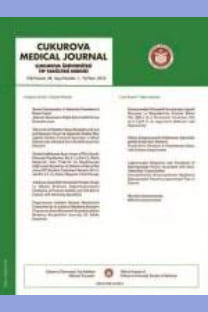Acil kontrasepsiyon hakkında tıp öğrencilerinin bilgi ve tutumları
Acil kontrasepsiyon, Bilgi, Davranış, Tıp öğrencisi, Lefkoşa
Knowledge and attitudes of medical students about emergency contraception
___
- 1. Öztaş Ö, Artantaş AB, Tetik BK, Yalçıntaş A, Üstü Y, Uğurlu M. 18-49 yas grubu evli kadinlarin ureme sagligi ve kontrasepsiyon hakkindaki bilgi, tutum ve davranislari. Ankara Med J. 2015;15:67-76.
- 2. United Nations Department of Economic and Social Affairs Population Division. Trends in contraceptive use worldwide. Geneva, United Nations. 2015.
- 3. Alkema L, Kantorova V, Menozzi C, Biddlecom A. National, regional, and global rates and trends in contraceptive prevalence and unmet need for family planning between 1990 and 2015: a systematic and comprehensive analysis. Lancet 2013;381:1642–52.
- 4. World Health Organization Media Centre, EC, Fact Sheet N244, 2012. Geneva, WHO, 2012. 5. ICEC and FIGO. Emergency Contraceptive pills. p.
- 5. Available at: http://www.cecinfo.org/customcontent/uploads/2014/01/ICEC_Medical-andService-Delivery-Guildelines-English_June-2013.pdf (Accessed Jul 2018).
- 6. How emergency contraception works - How are emergency contraceptive pills different from the abortion pill (Mifeprex, also referred to as RU-486)? Available at: http://ec.princeton.edu/ questions/ecnotru.html (Accessed 29 Sep 2016).
- 7. Premila W, Ashok, Prabhath T. Wagaarachchi1, Gillian M. Flett, Templeton A. Mifepristone as a late post-coital contraceptive. Human Reprod. 2001;16:72-5.
- 8. Medical methods for first trimester abortion. RHL Summary14 March 2016 Key findings. http://apps.who.int/rhl/fertility/abortion/cd002855 /en/ (Accessed 29 Sept 2016).
- 9. Coetzee MH, Ngunyulu RN. Assessing the use of contraceptives by female undergraduate students in a selected higher educational institution in Gauteng. Curationis. 2015;38(2):Art.#1535,.
- 10. Virtala A. Family planning among university students in Finland (Academic dissertation). Tampere, University of Tampere, 2007.
- 11. Hoque ME, Ghuman S. Knowledge, practices, and attitudes of emergency contraception among female university students in KwaZulu-Natal, South Africa. PLoS One. 2012;7:e46346..
- 12. Daniels K, Jones J, Abma J. Use of EC among women aged 15-44: United States, 2006-2010. Washington, US Department of Health and Human Services, Centers for Disease Control and Prevention, 2013.
- 13. Craig AD, Dehlendorf C, Borrero S, Harper CC, Rocca CH. Exploring young adults' contraceptive knowledge and attitudes: Disparities by race/ethnicity and age. Womens Health Issues 2014;24:281-9.
- 14. World Health Organisation. Emergency contraception. Geneva, WHO, 2018.
- 15. Shiferaw BZ, Gashaw BT, Tesso FY. Factors associated with utilization of emergency contraception among female students in Mizan-Tepi University, South West Ethiopia. BMC Res Notes 2015;8:817.
- 16. Puri S, Bhatia V, Swami HM, Singh A, Sehgal A, Kaur AP. Awareness of emergency contraception among female college students in Chandigarh, India. Indian J Med Sci. 2007;61:338-46.
- 17. Martins LBM, Costa-Paiva L, Osis MJD, de Sousa MH, Pinto Neto, AM Tadini V. Knowledge of contraceptive methods among adolescent students. Rev Saude Publica. 2006;40:57-64.
- 18. Addo VN, Tagoe-Darko ED. Knowledge, practices, and attitudes regarding emergency contraception among students at a university in Ghana. Int J Gynecol Obstet. 2009;105:206-9.
- 19. Ahmed FA, Moussa KM, Petterson KO, Asamoah BO. Assessing knowledge, attitude, and practice of emergency contraception: a cross–sectional study among Ethiopian undergraduate female students. BMC Public Health 2012;12:110.
- 20. Wasie B, Belyhun Y, Moges B, Amare B. Effect of emergency oral contraceptive use on condom utilization and sexual risk taking behaviours among university students, Northwest Ethiopia: a crosssectional study. BMC Res Notes 2012;5:501.
- 21. Aggarwal O, Sharma AK, Chhabra P. Study in sexuality of medical college students in India. J Adolesc Health. 2000;26:226-9.
- 22. Fantahun M, Chala F, Loha M. Knowledge, attitude and practice of family planning among senior high school students in North Gondar. Ethiop Med J. 1995;33:21-9.
- 23. McCance C, Hall DJ. Sexual behaviour and contraceptive practice of unmarried female undergraduates at Aberdeen University. BMJ. 1972;2:694-700.
- 24. Araoye MO, Fakeye OO, Jolayemi ET. Contraceptive method choices among adolescents in a Nigerian tertiary institution. West Afr J Med. 1998;17:227-31.
- 25. Aziken ME, Okonta PI, Ande ABA. Knowledge and perception of emergency contraception among female Nigerian undergraduates. Int Fam Plan Perspect. 2003;29:84-7.
- 26. Larsson M, Aneblom G, Eurenius K, Westerling R, Tydén T. The adoption of new contraceptives methods- surveys and intervention regarding emergency contraception. Acta Obstet Gynecol Scand. 2006;85:1142-3.
- 27. Goulard H, Moreau C, Gilbert F, Job-Spira N, Bajos N. Contraceptive failures and determinants of emergency contraception use. Contraception. 2006;74:208-13.
- 28. Agrawal VK, Agrawal P. Knowledge, awareness and perception of female students of emergency contraceptive pills. J Behav Health 2013;2:230-5.
- 29. Chandna A, Nath J, Dhingra D. Awareness of emergency contraception among 1st year medical students. International Journal of Contemporary Medical Research. 2016;3:1568-70.
- 30. Smith KG, Gilliam ML, Leboeuf M, Neustadt A, Stulberg D. Perceived benefits and barriers to family planning education among third year medical students. Med Educ Online 2008; 13:4.
- ISSN: 2602-3032
- Yayın Aralığı: 4
- Başlangıç: 1976
- Yayıncı: Çukurova Üniversitesi Tıp Fakültesi
Orbita fraktürü sonrası gelişen pnömomediasten
Halit KARAKISA, Müge GÜLEN, Ahmet SÖNMEZ, Salim SATAR
Bipolar bozuklukta özkıyım davranışlarının değerlendirilmesi
Kerim UĞUR, Lut TAMAM, Nurgül ÖZPOYRAZ, Mehmet Emin DEMİRKOL
Bengü Gülhan AYDIN, Gamze KÜÇÜKOSMAN, Özcan PİŞKİN, Dilek OKYAY, Bilgehan AÇIKGÖZ, Hilal AYOĞLU
İsa Burak GÜNEY, Kadir Alper KÜÇÜKER
Çocuklarda psödotümör serebri: etyoloji, klinik bulgular, prognoz
Gülen GÜL MERT, Neslihan ÖZCAN, Şeyda BEŞEN, Kemal YAR, Özlem HERGÜNER, Faruk İNCECİK, Şakir ALTUNBAŞAK
Nesbit yöntemi ile tedavi edilen konjenital penil kurvatür hastalarında uzun dönem sonuçları
Umut ÜNAL, Hakan ERÇİL, Erbay TÜMER, Ergun ALMA, Güçlü GÜRLEN, Nevzat Can ŞENER, Zafer Gökhan GÜRBÜZ, Yalçın EVLİYAOĞLU
İnfertilite tedavisinin anksiyete ve depresyon düzeyleri üzerine etkisi
Mahmut YASSA, Erol ARSLAN, Duru Saygin GULBAHAR
Cem Gökçen, Ali Evren Tufan, Fatih Akın, Gülen Güler Aksu, Meryem Özlem Kütük, Ayşenur Kardaş, Ayşe Sevde Sarp
Alime SELÇUK TOSUN, Handan ZİNCİR, Elif ELİŞ
Multiple myelom’da kromozomal aberasyonlar: klinik sonuçlar ve bortezomib’ e yanıt
Semra Paydaş, Arbil Açıkalın, Emine Kılıç Bağır, Perihan Alsancak
